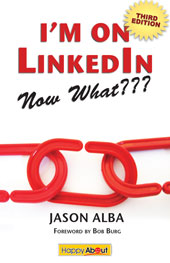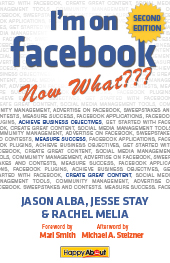
 I thought it important, this month, to pre-empt my current series on Monetizing Relationship Capital to discuss a topic that is on most everyone’s mind: the “financial crisis” occurring in the U.S. and seemingly, the rest of the world. Of course one might wonder why a publication about networking would even care or would have anything to say on the subject– what does networking have to do with economics, anyway? The answer is simply…EVERYTHING!
I thought it important, this month, to pre-empt my current series on Monetizing Relationship Capital to discuss a topic that is on most everyone’s mind: the “financial crisis” occurring in the U.S. and seemingly, the rest of the world. Of course one might wonder why a publication about networking would even care or would have anything to say on the subject– what does networking have to do with economics, anyway? The answer is simply…EVERYTHING!
Fact #1: All Business Networking is About Money
 One of the things I do with my audiences when I speak is poll them on how important networking is to their job or place of business on a scale from 1 to 10. Roughly 85% of my audiences feel that networking is between an 8 and a 10.
One of the things I do with my audiences when I speak is poll them on how important networking is to their job or place of business on a scale from 1 to 10. Roughly 85% of my audiences feel that networking is between an 8 and a 10.
We all engage in business networking for several reasons:
- More business
- Better resources
- Sharing ideas
- Better job opportunities/promotions
- Accomplish a goal.
And while we can say we network for these reasons, we’re really networking to affect our business’ bottom line. All the above reasons lead to either increasing revenue or decreasing costs. And of course, when we either make money for our company or save our company money, we are usually recognized in a positive manner, increasing our own personal Relationship Capital.
Fact #2: Money is not an End Result
We live in world where we all want money. In fact, most of the people I meet want more of it tomorrow than they have today. After all, it helps to have Financial Capital to pay rent or mortgage, go on that trip we’ve always wanted, get our kids a proper education, buy that sports car, etc. Yet one has to ask, “is it really the money I want, or what money buys me?”
Most of the time, what we really want with money is freedom, convenience, security, respect, the ability to “make a difference” or “give back” and peace of mind. What’s interesting here is that there is a strong link between money and perception, considering that all the above items are abstract concepts that mean different things to different people.
The point here is that money is merely a proxy or middleman by which assets are transferred. Money is considered the hard tangible stuff that we can see, feel and touch, while what it buys us (no matter how material) represents a “touchy feely”, intangible ideal.
Fact #3: Money is Just a Game We Play
Remember the game Monopoly? The idea is to use your money effectively in order to buy properties (named after famous locations in Atlantic City, NJ) in which you charge your opponents rent, which increases when you invest in houses and hotels. Of course the one with the most money at the end of the game is the winner, and in true Darwin-esque style, the one with the money has effectively crushed their opponents.
Now if I asked to play you in a game of Monopoly and said that you can start with all the money as long as I can start with all the properties, who would win? The answer is usually the person with all the properties…why? They are assets and can be leveraged for money. Therefore, the person with all the money finds themselves over time playing the game in a money pit whereby they constantly must pay rent.
In all, there is a game (albeit a sophisticated one) that we play each day to earn money or save money. Quite often, the game occurs in assessing fair value of assets. Why is it that some economists say that my legal tender dollar that I have in my pocket is now worth the equivalent of $0.27 while my Morgan silver dollar which is no longer legal tender is worth $18? Why is an original Picasso worth so much more than a lithograph of the same painting? What makes two people with similar sets of skills and knowledge worth different salaries?
In sales, there is an expression, “people buy emotionally and then rationalize their decisions rationally”. What this says is that the “emotional” sell is based upon our own independent value judgments too sophisticated for any analytical stock market model. In this personal “stock exchange of the mind” we make our own valuation (“sizing up”) of what a person knows and who they know. They only exception might be in the case of a commodity and even this can be argued.
The True Crisis
So when we look at today’s facts and figures on our global economy, housing markets, price of energy and unemployment, we have to ask ourselves, if this is the game we’ve created, then why do most of us feel like we’re losing? Does anyone really want to play a game that is broken? If the game is broken, is it time to get a new one?
I’ve heard a lot of pundits and experts talk about how this crisis has caused a lot of our “feel good” factor to suffer. Again perception plays a role in our financial well-being. If you had a team of unmotivated, uninspired and depressed individuals and another team of motivated, inspired and emotionally-secure individuals, which team would most likely get the best results?
The obvious answer is the team with the most positive mindset will do the best – there is a lot to be said for morale. But still the question must be begged: Do we need money to be happy or do we need to be happy to have money?
What then is the real crisis here? Is it financial as we might choose to believe, or is it a perceptual crisis?
In a recent conversation with my good friend (and TNNW brother-in-arms) Douglas Castle about this subject, we spoke about religious figures like The Pope and the Dalai Lama. Douglas noted that these folks may not have a lot of money and probably don’t need it, but their support network is enough to keep them going. In other words, they have enough Intellectual and Relationship Capital to support them in their endeavors. So does this mean that because they are not heavy on Financial Capital they aren’t happy? No!
I am not suggesting here that we should or shouldn’t try and emulate either of these individuals, but I am suggesting that we often overlook our own greatest asset and it’s not our house or our car…it’s ourselves. If we are in prime condition (internally and externally), Intellectual and Relationship capital will flow and provide us with all we need for years to come, whether there is a perceived shortage of money, oil, jobs, etc. or not. In fact, while money, oil and jobs can come and go, no one can ever take away your own Intellectual and Relationship capital unless we chose to have it taken away.
The danger of Financial Capital is that it can cause us to focus on the external, imaginary reflection of what and who we know to the point where it becomes a crutch. When that happens we loose all our power to affect our situation and often shut out others who can help.
Fortunately, while it seems as if money, oil, jobs, etc. are scarce, there is no end to the number of networking opportunities that exist, or the number of ways that we can change our current “financial crisis”.
It’s time for us to look within and find creative ways to change the game we’ve created. Remember…it took a network of individuals years to build the game, it will take another network of individuals to change it. The question is whether or not you’ll take part in it.

The Emergence of the Relationship Economy
Relationship Capital is the cornerstone of the Relationship Economy, which RNIA defines as an “economic system in which Relationship Capital influences the production, distribution, exchange, and consumption of goods and services.” I am proud to have contributed discussion of the Ten Laws of Relationships Capital to the upcoming book The Emergence of the Relationship Economy, now out as an eBook and in hardcopy. With a forward written by Doc Searls (of Cluetrain Manifesto fame), it is being considered a “must read” for anyone responsible for the strategic direction of their business. If you would like to purchase your own copy of The Emergence of the Relationship Economy, please click here.
________________________________________________________
Posted to THE NATIONAL NETWORKER. To subscribe for your free newletter, go to
www.TheNationalNetworker.com. For the complete National Networker Relationship Capital Toolkit and a free RSS feed, go to:
http://thenationalnetworkerweblog.blogspot.com.
Forward/Share This Article With Colleagues And Social Media:

There is No Financial Crisis
 Power Thought of the Week with Patricia Parham, Ph.D.
Power Thought of the Week with Patricia Parham, Ph.D.



























